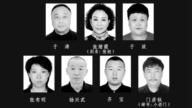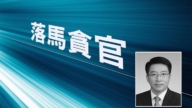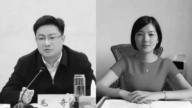【新唐人2014年09月11日訊】中共黨魁習近平上臺以來提出的「憲政夢」,在黨媒上總是時隱時現,引發網路熱議。觀察家們認為,是中共內鬥中,政治板塊的移位、擠壓、撞擊的結果,不過也有專家指出,習近平的「依憲治國」、「依憲執政」,只不過是強調中共在憲法中規定的,中共的執政地位。而如果習近平真的想為要百姓做事,就會像劉少奇一樣被中共體制排斥。
9月5號,中共黨魁習近平在中共人大制度60週年大會上,再次強調「依憲治國」、「依憲執政」。當天,《新華社》發佈的習近平講話原文,有這兩個口號。但是在《新華社》發的大會新聞通稿,和《人民日報》頭版頭條刊登的大會新聞中,卻找不到。
日前,香港大學新聞及傳媒研究中心,中國傳媒研究計劃主任錢剛,把習近平「依憲治國」、「依憲執政」的口號,在黨媒上出現的頻率梳理了出來。
前年12月初習近平首次提出:「依法治國首先是依憲治國,依法執政關鍵是依憲執政」。隨後,在《人民日報》上使用「依憲治國」或「依憲執政」的文章有6條。但進入去年,這兩句話開始降溫。去年1月,《人民日報》上沒有了這兩個詞語,同時,《南方週末》的新年獻詞《中國夢 憲政夢》被強令刪改。在以後的日子裡,「依憲治國」「依憲執政」伴隨著「「七不講」、反「憲政」的高潮,時隱時現。在去年末和今年初,這兩個口號再現形3次後,完全消失。
查看《人民日報》的報導, 從去年12月到今年8月「依憲執政」消失了9個月﹔從今年3月到8月「依憲治國」消失了6個月。
但也有憲政學者認為,習近平的「依憲治國」和「依憲執政」是指目前憲法序言中寫的:「中國共產黨是中國特色社會主義事業的領導核心」。按照黨的解釋,這句話規定了中共所謂的執政地位。
《亞洲新聞週刊》總監黃金秋:「其實對共產黨現在的憲法來講,它也不是一個真正的憲法,憲法規定共產黨領導一切。你想想看,一個政黨能凌駕於其他政黨或國家組織之上,對於憲法其實這是一種非法的憲法。因為正常的憲法,就是所有的黨派都應該是公平、平等競爭的這種關係。」
大陸歷史學者王思想:「他們說的話很多都是自相矛盾的,有些話他們自己都不信,他們只不過說出來而已。確實有些話可能會被主管新聞的某些人給刻意的隱瞞,但是這個比例很少。他們雖然內鬥,狗咬狗,但是在他們利益一致的時候,他們還是團結起來一起對付這些老百姓的,千萬不要有幻想。」
香港大學新聞及傳媒研究中心,中國傳媒研究計劃主任錢剛也指出,社會上也的確有許多善良的朋友,對改革抱有期許,每每從一些新的口號中讀出希望,忽略了新瓶裝的可能還是舊酒。
在習近平9月5號的講話中,他還提到了「維護社會公平正義,尊重和保障人權,實現國家各項工作法治化」。不過,《新華社》和《人民日報》的報導,也沒有反映出來。
而在今年反腐遇到阻力時,習近平以生死反擊的話語,也只能在地方小報上發表。
北京憲政學者陳永苗:「他如果說想做事情,或者是有良知的話,他會自動被這個體制給排斥掉的。」
大紀元社論《九評共產黨》指出,在中共的歷史上黨的領導人都是悲劇收場,黨自己卻頑強的活著。能生存下來的領導人不是能操縱黨的,而是摸透了黨的,順著黨的邪勁兒走,能給黨加持能量,能幫助黨度過危機的。
而習近平本人也曾經受過中共迫害,他15歲時,在文革中,被多次關押審查。《亞洲新聞週刊》總監黃金秋曾經指出,習近平如果真想有所作為,應該利用現在的地位,結束共產黨的歷史,使中國真正走向民主憲政。
採訪編輯/劉惠 後製/陳建銘
Xi Jinping ‘s Dream of Constitutionalism Flickers in Party Media.
The Chinese Communist Party (CCP) leader Xi Jinping ‘s “dream of
constitutionalism" has been a hot topic among Chinese netizens.
The phrase is mentioned by party mouthpieces again and again.
This is regarded by political observers as a result of clashes from
the CCP’s internal struggle.
Experts said, Xi ‘s “rule in accord with constitution " is only to
underline the CCP ‘s “ruling role" according to its constitution.
If Xi really intends to serve for the people, he will be repelled by
the whole CCP regime just as Liu Shaoqi was.
On Sep. 5, Xi Jinping again laid stress on “rule in accord with
constitution" in his speech at the 60th anniversary meeting of
the People ‘s Congress. The same day, the transcript of Xi ‘s
speech published by Xinhua also included that key phrase.
On the other hand, it was not mentioned in Xinhua ‘s news
release or People ‘s Daily headline news about the meeting.
Qian Gang is director of China Media Project Journalism and
Media Studies Centre of Hong Kong University.
Qian recently researched how frequently Xi ‘s “constitutionalism"
comments appeared in reports of party mouthpieces.
In December 2012, Xi for the first time presented the idea saying
“Rule of the law is based on rule in accord with constitution."
Following that, 6 People ‘s Daily articles quoted Xi ‘s words.
However, Xi ‘s comment was cooled down and disappeared
from People ‘s Daily from January 2013.
Southern Weekly ‘s New Year message “Dream of China is the
dream of constitutionalism" was also forcibly removed.
After that, Xi ‘s “rule in accord with constitution" flickered in
media reports as the political situation changed.
After being used 3 times in late 2013 and early 2014, the word
had completely disappeared.
By tracking People ‘s Daily reports, one can find that the phrase
“rule in accord with constitution" disappeared for 9 months from
December 2013 and August 2014. “Governance in accord with
constitution" was gone for 6 months from March to August 2014.
There are comments from constitutional scholars that Xi ‘s words
refer to what is written in the preface of the CCP ‘s constitution;
“The CCP is the core of leadership for the cause of socialism
with Chinese characteristics."
The CCP said this sentence “defines the CCP ‘s ruling role"
in China.
Huang Jinqiu, director of Asian Newsweek: “the CCP ‘s current
constitution is not real as it says the CCP should lead everything.
Think about it, any constitution saying one party is above any
other party or state departments cannot be legitimate.
Any real constitution must require all parties to compete
in a fair manner."
Wang Sixiang, Chinese historical scholar, “many of the CCP ‘s
words are self-contradicting.
Even party leaders don ‘t believe in what they say.
They just say it and that ‘s it.
It is possible that what leaders say is intentionally removed
by propaganda officers, but those are only rare cases.
The CCP has internal struggles, but they always unite to crack
down on ordinary people to protect their common interests.
We should not have any illusive hope toward the CCP."
Qian Gang said there are many in Chinese society who hold
goodwill and expect political reform.
They try to find some hope from new slogans of the party,
but usually ignore that there is nothing new behind them.
In Xi ‘s speech on Sep. 5, he also mentioned, “defend social
fairness and justice";
“Respect and protection of human rights”; and “legalization
of state work".
However, Xinhua and People ‘s Daily also ignored those
words in their reports.
In 2014, Xi had had to show his attitude of “fighting corruption
with his life" in the local newspaper.
Chen Yongmiao, Beijing constitutional scholar, “if Xi wants to do
something with his conscience, he will be repelled by the regime."
The Epoch Time ‘s Nine Commentaries on the Communist Party
said:"Many party leaders ended their political life in tragedy,
yet the CCP has survived";
“The CCP leaders who survived their positions were not those
who could influence the Party, but those who could comprehend
the Party ‘s evil intentions and follow them";
“They strengthened the CCP ‘s ability to survive while in crisis,
and gave themselves entirely to the Party."
Xi himself had also suffered from the CCP ‘s persecution. He was
detained many times during the Cultural Revolution at 15.
Huang Jinqiu commented that, If Xi really wants to make some
achievements, he should use his role to end the CCP ‘s rule and
push China to real democracy and constitutuionalism.
Interview & Edit/LiuHui Post-Production/Chen Jianming





























